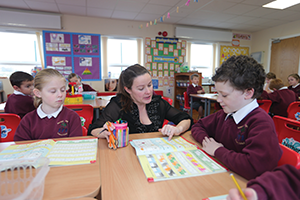One in five children unable to read
 Report finds one in five children in Northern Ireland leave primary school unable to read.
Report finds one in five children in Northern Ireland leave primary school unable to read.
A recent report by Save the Children finds that children experiencing poverty are more likely to fail to meet expected reading levels as they leave primary school. It also claims that as many as one in five children in Northern Ireland leave primary school unable to read well.
According to the report, learning to read well starts early and if children don’t develop their understanding of the meaning and words of stories, they will struggle to read well when they get to primary school. By the age of five, most children should be able to speak in full sentences and use most of the everyday words that adults use. They should be asking lots of ‘why?’ questions to enable them to understand the world around them and be able to talk confidently about the past and the future.
Falling behind at this level has a huge impact on reading ability by age 11. The report suggests that a child with weak language skills at the age of five is much less likely to be a strong reader at the age of 11 than a five-year-old with strong language skills. Similarly, a child with below average language skills who experiences poverty persistently scored 38 per cent less on reading tests at age seven and 23 per cent less on comprehension tests at age 11 than a child who has never experienced poverty and has above average language skills.
Whilst there is a recognition that a child’s genetic inheritance and innate ability have a role in influencing how early their language skills develop, the report has identified four sets of factors that interact with each other to shape a child’s language skills by the age of five. These are:
• language skills at the age of three;
• the bond between parent and child and the way parents use language at home;
• negative impact of poverty on early learning opportunities;
• provision of high quality childcare and pre-school education led by a trained teacher or early years graduate.
The report stresses the importance of acting early and supporting parents to engage with their child’s learning as a means to combat, ‘entrenched underachievement in reading’ and notes the importance of health visits, speech and language therapists, the Sure Start programme, pre-schools and libraries.
Focusing its attention on what more can be done to support the poorest children, the report suggests a mix of universal services that support all children as well as extra support for those who fall behind is needed to remedy the situation.
The charity has identified three priority areas for the Northern Ireland Executive and local services to focus on. These are:
• increased investment in early years workforce including ensuring that by 2020 all pre-school settings are led by graduates with expertise in early years childhood studies;
• ensuring childcare and early years staff have the ability to support parents with their children’s early language development, especially those parents living in poverty;
• introduce national child development measures to track young children’s progress against agreed milestones and outcomes from birth to school.
Speaking about the report, the head of Save the Children in Northern Ireland, Fergus Cooper stressed the importance of getting more parents involved in their child’s education.
“Every parent wants their children to succeed but many parents don’t know what the key things they need to do to reinforce the learning are,” he said. “Early language development is a key skill that leads on to good reading, so we need to invest and engage much earlier.”





